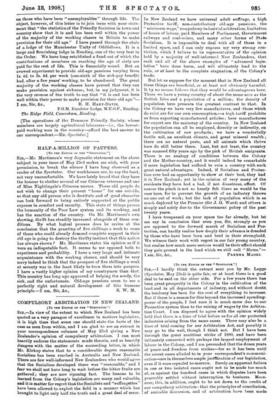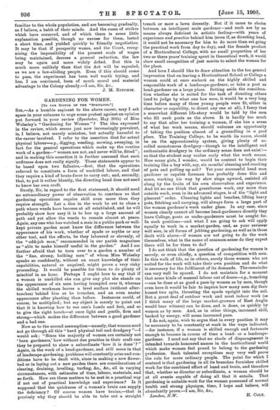TER EDITO1 OP TIE " 9FRCTAT01121
SIR,—I hardly think the extract sent you by Mr. Legge (Spectator, May 23rd) is quite fair, or at least there is a good deal to be said on the other side. For a few years there has been great prosperity in the Colony in the cultivation of the land and in all departments of industry, and without doubt the tendency has been for the cost of everything to increase. But if there is a reason for this beyond the increased spending- power of the people, I feel sure it is much more due to our Protective system than to the raising of wages by the Arbitra- tion Court. I am disposed to agree with the opinion widely held that there is a time of trial before us for all our protected industries arising from the same cause. There may also be a time of trial coming for our Arbitration Act, and possibly it may go to the wall, though I think not. But I have been through the great maritime strike of 1890, and have been intimately connected with perhaps the largest employment of labour in the Colony, and I am persuaded that the dozen years of peace and freedom from strikes—for so it has been until the recent cases alluded to in your correspondent's communi- cation--are in themselves ample justification of our legislation, even if it were repealed to-morrow. Surely an apparent failure in one or two isolated cases ought not to be made too much of, as against the hundred cases in which disputes have been peaceably settled without interruption to business. More- over, this, in addition, ought to be set down to the credit of our compulsory arbitration: that the principles of conciliation, of amicable discussion, and of arbitration have been made familiar to the whole population, and are becoming gradually, as I believe, a habit of their minds. And the cases of strikes which have occurred, and of which there is some little explanation possible, though no excuse for them, lasted a short time, and yielded quickly to friendly negotiation. It may be that if prosperity wanes, and the Court, recog- nising the impossibility of the present scale of wages being maintained, decrees a general reduction, the law may be again and more widely defied. But this is much more unlikely than that the Act will be repealed, as we are a law-abiding people. Even if this should come to pass, the experiment has been well worth trying, and has, I am convinced, been of much moral and material' advantage to the Colony already.—I am, Sir, &c.,
J. M. RITCHIE.







































 Previous page
Previous page